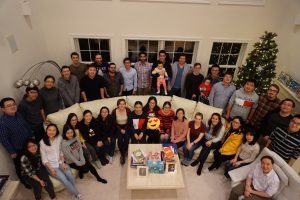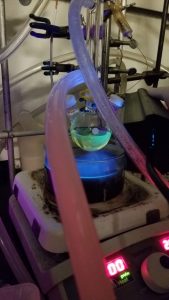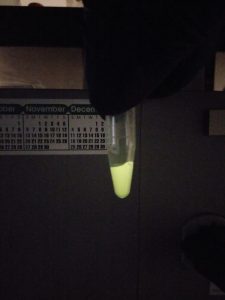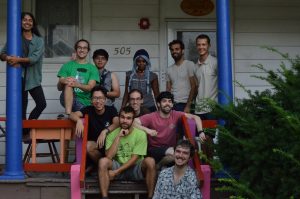September 14, 2020, by Mei Kee Lee
Overseas Attachment Experience – Wai Jing Luen (PhD)
PhD is indeed a once-in-a-lifetime adventure in which surprising opportunities are always presented at some of the most unexpected time. For me, I was offered a chance for an overseas laboratory attachment hosted by Professor Yi Lu from University of Illinois at Urbana-Champaign (UIUC, USA) in my year 2. UIUC is a public research university founded since year 1867 and located at Illinois, a middle-western state famously known not only because of having the Chicago city, but also being one of the largest states in terms of corn production. Inside the twin cities of Champaign and Urbana, the campus town of UIUC has a lot of beautiful parks with breath-taking sceneries, various festival events as well as some of the most welcoming cultures. I personally highly recommend visiting their Japan House and attend the Urbana Sweetcorn Festival, both among the iconic “must-do” list when you are at Urbana-Champaign!
 |
| Beautiful scenery of UIUC campus with its iconic sculpture, the Alma Mater. |
Having about 40 active researchers (UGs, PGs, Postdocs and Invited Scholars) at the time, the Lu Group is among the top research groups in the world renowned for their active works and contributions in the fields of inorganic chemistry, functional DNA nanotechnology and nanosensors. Prof Lu has also been ranked among the world’s most influential researchers consecutively from year 2015 to 2018. My attachment programme in Lu Group lasted for approximately 16 months in total across the years of 2018 and 2019, during which I have been primarily involved in developing novel nanosensors used for biomarkers or metal ions detection and imaging in either biological or environmental samples. These nanosensors are designed based on the latest DNA nanotechnology, such as DNA aptamers and DNAzymes (DNA version of antibody and enzyme respectively) as well as nano-/bio-materials including nanoparticles, quantum dots and luciferase proteins.
 |
| Jing Luen (standing 2nd to the left), Prof Lu (sitting at the rightest corner) and most Lu Group’s members. Taken during the annual Christmas party in year 2018. |
I must say, it was truly an eye-opening experience for me. The academic cultural shock I had especially during each meeting, has undoubtedly left a long-lasting impact on how I perceive scientific research. For example, with each of us coming from various background, it is really fascinating to see how each meeting can easily turn into either a hot debating conference, or an impromptu seminar. With two meetings every week (Monday and Thursday, mostly evening), I’ve learnt a lot especially on the importance of professionally expressing one’s own opinions, a trait that seems to be atypical nowadays. Throughout the course of drafting, executing and analysing or even simply presenting a research project, disagreement is bound to happen and hence, it is critical to sort it out, thus finding a common ground between any two (or more) parties. Lacking consensus or moving forward with doubts can only bring nothing but harms to the overall development for any project. Besides, in order to achieve something, we must acknowledge the importance of sharing, particularly in terms of our expertise or experience. Most of the time during my discussion with different people, a simple question as “What do you think about it?” can really spark a new brainstorm session, leading to surprisingly interesting conclusion. One of the main principles I’ve learnt is that, we will never be successful if we are constantly hiding something from one another. 学问,学问,要学就要问; knowledge can only be acquired through asking. So, never afraid to ask if you have doubts, and never afraid to share what you know!
In terms of research activities, I was lucky enough to work on projects using some latest technology. For example, one of my projects involved the application of photoacoustic imaging, a rather novel imaging technique that converts light energy (usually from non-ionising laser pulse) into thermal energy (causing thermoelastic expansion) which can be detected in the form of ultrasonic emission, allowing appropriate reconstruction to obtain an image. Compared to conventional imaging techniques available, photoacoustic imaging promises observation through deep penetration with less background noises, hence revealing more details despite buried under thick biological tissues. Another project was based on the application of DNAzymes, in which I exploited the functional properties of certain DNA strands that can perform enzymatic reactions to cleave its complementary strand at specific position (much like endonucleases) under specific conditions. Both projects were huge challenges to me despite having another PG student supporting me. With a small group of just 2 people, we had to work on pretty much everything from scratch, including developing and pitching the ideas, scouting and purchasing relevant materials, conducting and troubleshooting the experiments itself. To be honest, I couldn’t recall how many failures we have encountered, how many times our ideas being rejected or how many versions of the proposal that we’ve revised to finally achieve the proof-of-concept. However, I can still remember the joy I shared with my groupmate that, after so many endless days and nights (we can work 24/7 there!), we finally proved that our idea works! To date, these projects are still actively in progress with new data being reported and discussed from time to time.
  |
| Top: Synthesis of fluorescent quantum dots derived from cadmium and selenium (CdSe QDs). Bottom: Bioluminescence of bio-engineered luciferase protein and fluorophore undergoing an interaction known as bioluminescence resonance energy transfer (BRET). |
From the perspective of social life, I’m glad to live in a co-op house called Brooks. Apart from myself, there are 13 other residents here, supporting one another in many different ways (hence the term “co-op”, or cooperative). Co-op housing is a concept in which the residents are expected to cooperate on every relevant aspect regarding their accommodation, including cleaning, maintenance, recruitment, and other miscellaneous aspects such as legal issue, permit applications, etc. While some of them can be trivial, living in a co-op house basically means you (together with other residents) own the house and are therefore responsible for it. We are also supposed to help each other and grow together too, like taking turn to cook for everyone in the house once a week so everyone can come home expecting a warm dinner awaiting them! Thanks to my fellow housemates who warmly welcomed and accepted me into their community, I had chance to experience American’s life (at least partially). The most noticeable difference I can spot is that, they DO wear their shoes inside the house. And oh my… they even wear it onto their bed! Then, there is this practice that they have to vote on everything before making a group decision (which can take a long time to convince one another). Other than that, I also enjoyed their culture of having bonding night from time to time. For about once every week, they will invite some friends or neighbours for a small house party that everyone can relax together, play some board games or watch some movies and basically, enjoy ourselves. I was glad that they showed great interest when I introduced them to the Ip Man series, despite having difficulty when they asked me for Cantonese-English translation. It never occurs to me that something as common as “holding a chopstick”, or “explaining porridge, soup, or stew” can actually be incredibly difficult for other people to comprehend. There are so many other pleasant memories too, such as camping, co-op conference (yes, they even have a North American co-op conference!), etc.
 |
| Group photo with most Brooks house’s members during my stay in year 2018. Taken after an exhausting day-long spring cleaning of the house. It was my first time climbing up to the roof of a house to clean it. |
To end this otherwise never-ending post, I wish to take this opportunity to express my sincere gratitude to everyone who supported me throughout this wonderful journey, especially Dr New (my PhD supervisor) and Prof Lu (UIUC attachment supervisor). Thank you so much for your guidance and patience. I would also wish to thank School of Pharmacy, UNM for the administrative support. Last but not the least, I would like to give a big shout-out to my family and labmates for tolerating me! Thank you for the time and effort in reading this! ?
-
Post a comment
